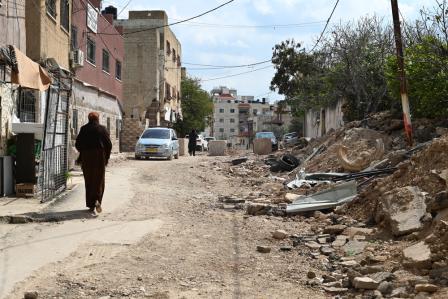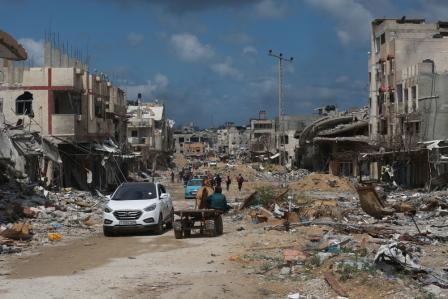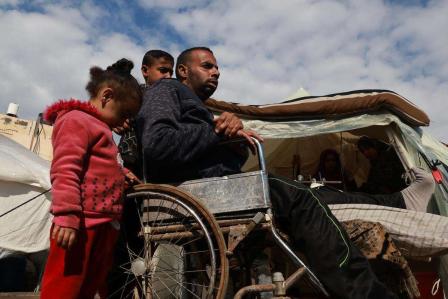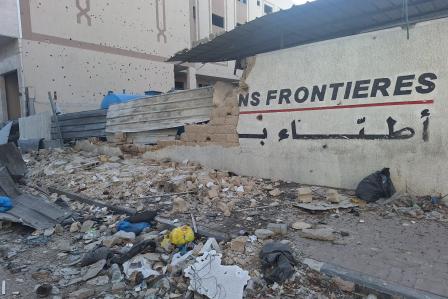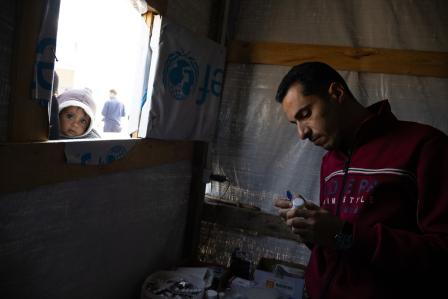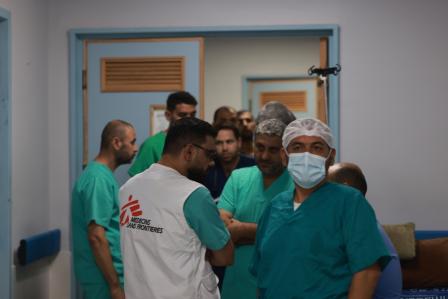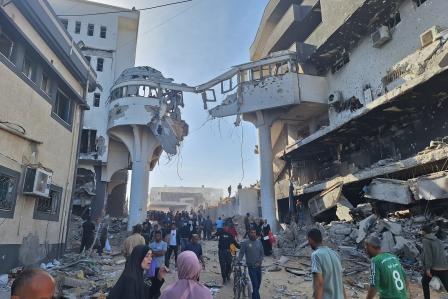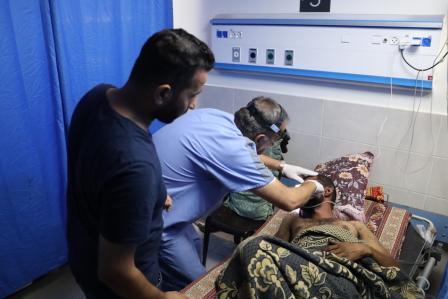Gaza: Attacks on humanitarian workers make vital assistance near impossible
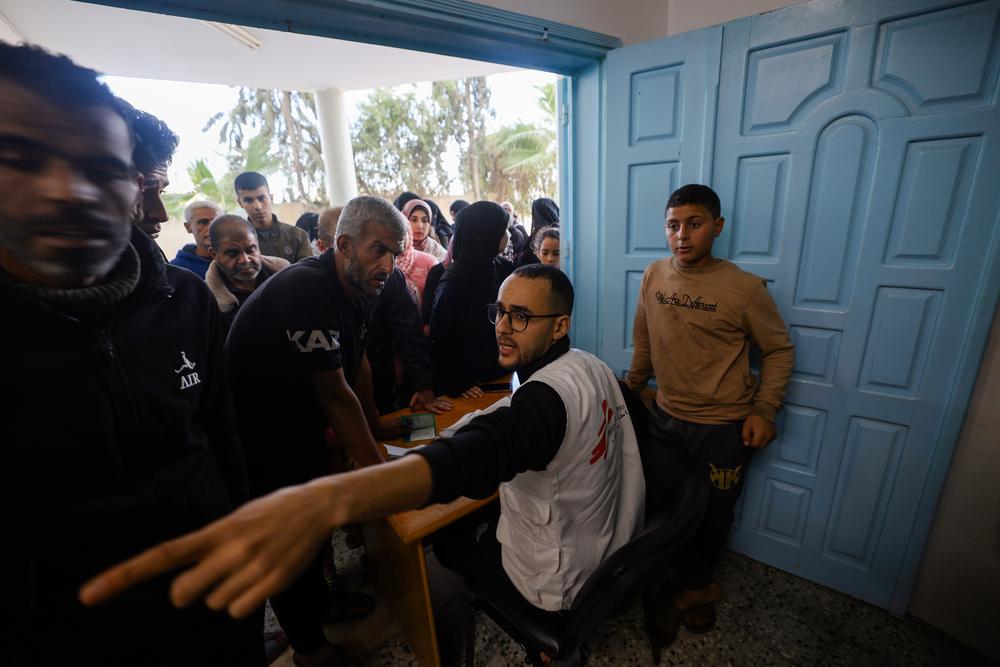
Doctors Without Borders health worker attends people at the waiting area in Al-Shaboura clinic. Palestinian Territories, December 2023. © Mohammad Abed
One month ago, the International Court of Justice (ICJ) issued provisional measures ordering Israel to prevent and punish acts of genocide and ensure that basic services and aid reach people in the Gaza Strip. However, the humanitarian situation for trapped Gazans remains catastrophic. According to local health authorities, the number of people killed in Gaza has risen to 30,000, all while there are no signs of Israeli forces attempting to limit the loss of civilian life or alleviate the suffering of people.
Israel’s tightened blockade of Gaza hinders the entry of vital supplies into the enclave. At the same time, the provision of aid within the enclave is near impossible due to Israel’s complete disregard for the protection and safety of medical and humanitarian missions and their staff cutting people off from life-saving aid. This reality is making the humanitarian response in Gaza a mere illusion.
The stark absence of humanitarian space and lack of supplies we’re witnessing in Gaza is truly horrific. If people are not killed by bombs, they are suffering from food and water deprivation and dying from lack of medical care.Lisa Macheiner, Project Coordinator
Medical and humanitarian staff forced to risk their lives
Nowhere in Gaza is safe, neither for civilians nor for those trying to provide them with essential aid. Israel’s blatant and total disregard for the protection of Gaza’s medical facilities or humanitarian workers has made the provision of care and lifesaving assistance an almost impossible task.
In the past five months, healthcare facilities have been subjected to evacuation orders and repeatedly attacked, besieged and raided. Medical staff and patients have been arrested, abused and killed while caring for patients. This includes five of our own staff from Doctors Without Borders / Médecins Sans Frontières (MSF). Several family members of our staff have also been killed.
In one of the latest instances of ruthless targeting of healthcare facilities, Nasser hospital, the largest hospital in southern Gaza, was besieged for weeks. After a shell struck the orthopeadic department, killing and wounding several people, Doctors Without Borders staff were forced to flee and leave patients behind. One Doctors Without Borders staff member was detained at a checkpoint by Israeli forces while trying to leave the compound. We reiterate our call to Israeli authorities to share information about his whereabouts and to protect his wellbeing and dignity.
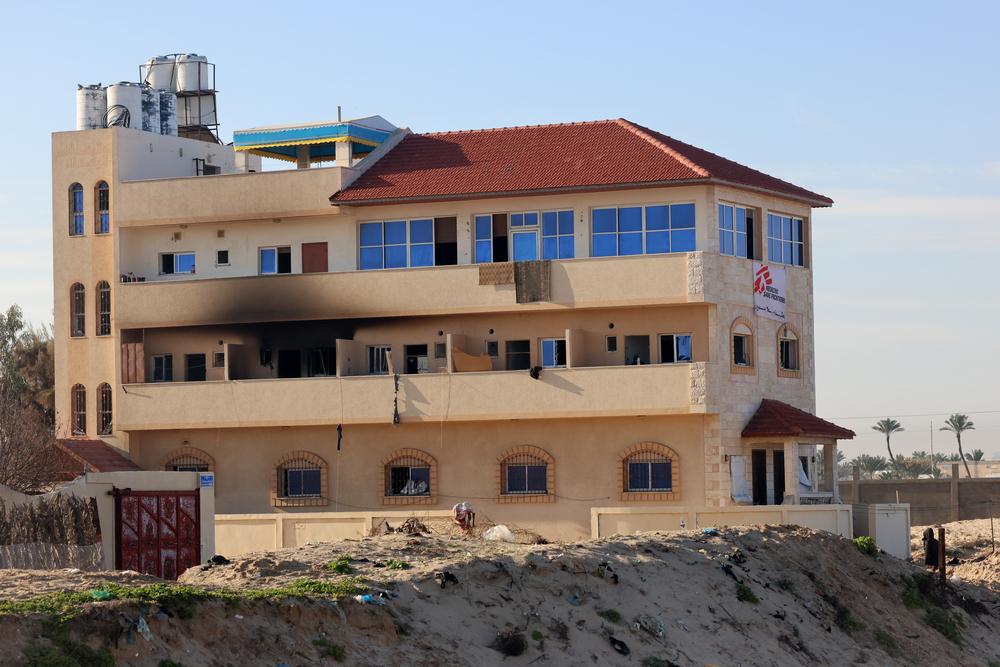
On the night of 20 February 2024, Israeli forces conducted an operation in Al-Mawasi, Khan Younis, Gaza, where a shelter hosting MSF staff and their families was shelled. Palestinian Territories, February 2024. © Mohammed Abed
Medical staff who remain inside the hospital describe a horrific situation, where patients are trapped with limited food and no electricity or running water.
“Every evening, I say goodbye to my Palestinian colleagues. Every morning, I am afraid I won’t see them in the next morning meeting,” says Macheiner. “Every day it feels like we are increasingly running out of options – to treat the wounded, to get the medical supplies, or provide the water that people desperately need.”
In the late evening on 20 February, an Israeli tank shelled an Doctors Without Borders shelter in Al-Mawasi, killing two family members of an Doctors Without Borders staff and injuring seven others. Israeli forces had been clearly informed of the precise location of the shelter underscoring that nowhere in Gaza is safe and that deconfliction mechanisms are unreliable.
Restrictions and lack of protection of aid convoys
North or south, humanitarian responders have no safety assurances to conduct their work and their convoys are being blocked and severely delayed at checkpoints, making it impossible to reach people in desperate need.
The north of Gaza has been largely cut off from assistance for months, leaving people trapped and with no choice but to attempt to survive on miniscule amounts of food, water and medical supplies. Entire neighborhoods have been bombed and destroyed. Although Doctors Without Borders has limited visibility of the overall humanitarian and health situation in the north, a few of our staff members remain trapped there.
The situation in the north of Gaza is catastrophic and getting worse. There are no hospitals for even basic treatment, and the pharmacies are empty of drugs. My children have been sick for weeks because of the lack of clean water and proper food, and they are getting worse.Doctors Without Borders nurse
According to the United Nations, between 1 January and 12 February, half of missions planned by humanitarian partners to deliver aid and undertake assessments in areas north of Wadi Gaza were denied access by the Israeli authorities. The World Food Programme (WFP) is the latest humanitarian organisation forced to halt lifesaving assistance to northern Gaza, saying the conditions do not allow for the safe distribution of food.
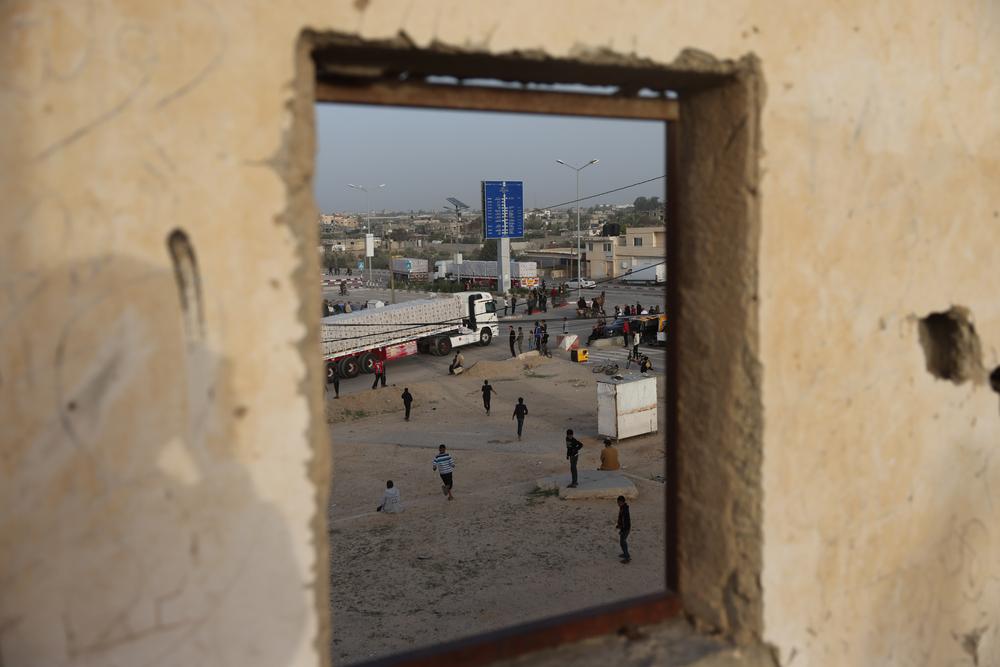
The number of trucks entering Gaza dropped from an average of 300 to 500 trucks daily before the war, to an average of just 100 trucks daily. Palestinian Territories, November 2023. © MSF
“People cannot endure any more suffering”
As part of Israel’s complete and inhumane siege of Gaza, the severing of aid supplies has plunged some two million people in Gaza into desperation. The number of trucks entering the enclave dropped from an average of 300 to 500 trucks daily before the war, to an average of just 100 trucks daily between 21 October and 23 February. On 17 February, only four trucks were allowed into Gaza.
Prolonged and unpredictable administrative procedures for aid deliveries to Gaza are impeding access to lifesaving equipment and supply for healthcare facilities. It can take up to one month for supplies to enter Gaza as each box in each truck is submitted to screening. If Israeli authorities reject even one single item during the screening process, the entire cargo must be returned to Egypt. With no official list of restricted items, Doctors Without Borders has consistently been denied the import of power generators, water purifiers, solar panels and various medical equipment.
“Every second that supplies are delayed, and every time an item is blocked, more devastating and unacceptable suffering is caused,” says Macheiner. “These supplies mean the difference between life and death for many people.”
In Rafah, southern Gaza, some 1.5 million forcibly displaced people are living in horrific conditions. They lack the basics needed to survive. Women are forced to use scraps of clothing as sanitary pads, and people are living in muddy tents without mattresses or warm clothing.
“People with chronic conditions such as cancer, diabetes or epilepsy have barely any access to drugs and medicine,” says Dr Hossam Altalma, a Doctors Without Borders doctor who works in the Al-Shaboura clinic. “People are desperate and willing to pay any price to get medication.”
Doctors Without Borders teams continue to provide humanitarian and medical care in Gaza where possible including surgery, post-operative care, maternity care, mental health support and water distribution. But this is all a drop in the ocean in comparison to people’s needs. Doctors Without Borders calls once again for an immediate and sustained ceasefire, meaningful safety assurances for humanitarian workers, and the end to the inhumane blockade, to ensure people receive life-saving assistance.
People in Gaza cannot endure any more suffering. They have lost all sense of safety, whether from the constant threat of being killed by bombs at night or the uncertainty of finding their next meal or drink of water.Lisa Macheiner, Project Coordinator
Will you support our emergency response work?
Help us provide lifesaving medical care during emergencies by making a donation today.
